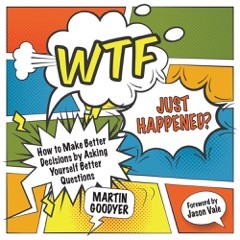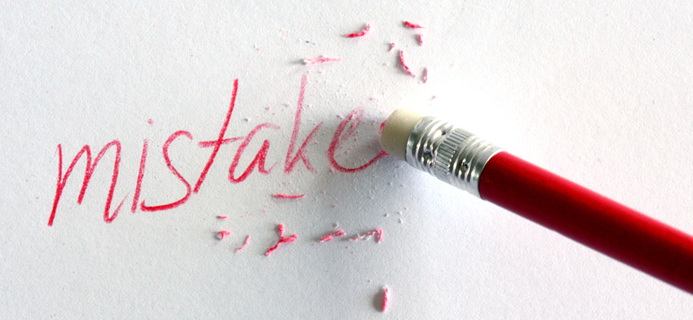Feel like you’re failing at life? If you’re making life mistake after life mistake, Martin Goodyer, author of new book WTF Just Happened?: How to Make Better Decisions by Asking Yourself Better Questions has advice on what to do instead
We all have the potential to make hundreds of mistakes and unfortunately many of us do our best to reach that potential. However, luckily most are not serious and many are easily fixed – unlike the seven I’ve picked out here which are both common and serious mistakes that people make all the time. Good news is, they can be avoided in advance by knowing they are a likely rock on life’s road, and once recognised they can also be addressed even if they’ve been a problem for years.
Robert Topala, a Sweden based developer, developed a game known as Geometry Dash Geometry Dash for iOS This game is a 2013 mobile and steam based game
-
Assuming most people share your view
In today’s social-media world it’s easy to imagine that all those ‘likes’ and nice comments are representative of ‘everyone’, but they’re not. Come on, get real; how many of those ‘friends’ do you know well? These friends of friends of friends keep popping up so it feels like you do know them, yet, you don’t.
It’s not going to help your confidence to stamp your foot and say ‘I know I’m right, just …because!’ Confidence and self-esteem come from knowing that you know.
However, add them to the fact that your real friends probably also agree with many of your views and ideas and it makes it highly likely you’ll start making some assumptions. In the absence of being prodded with the sharp stick of reality you may behave as if your view is widely shared and it won’t be until they come crashing down to earth that realisation kicks in. The likelihood is that more people don’t agree with you than do, so ask yourself a better question. Rather than asking why not everyone agrees with you, instead ask what it is that makes you so sure you are right and dig deep into your reasoning and understanding. It’s not going to help your confidence to stamp your foot and say ‘I know I’m right, just …because!’ Confidence and self-esteem come from knowing that you know. It genuinely is as simple as that. If there is an aspect of life in which you want to be more confident all you need do is figure out what you must do to ‘know that you know’ all you need to know about that issue.
2. Believing in diets
I imagine it’d be hard to find too many who don’t already know what to do to get fitter and change shape. Excluding those who for medical issues have their own, often very rare reasons as to why moving more and consuming less doesn’t work for them, the rest of us haven’t much of an excuse.
Those who know they must change do better than those who think they ought-to
I had the dubious pleasure of coaching a group of participants on a reality-TV show, and for five weeks spent my early mornings working out on the hotel running machine while watching the early morning re-run from the day before. Watching them attempting to change lifelong habits in front of a TV audience, it was easy to spot those who would make a change and those who would not.
MORE: How to lose weight – a nutritionist’s golden rules
Guess what, it had nothing to do with introducing them to new diet regimes. But, it is about introducing them to new ways of living. It is about desire and commitment. Those to whom change had become a must and not a should or an ought-to were always going to do better. Success with weight-management is about knowing what specific ‘shape’ or fitness level you want to achieve. It is about having a belief that it is possible, and a plan of how to integrate new behaviours into ordinary life so that change comes about sustainably rather than as a temporary fix delivered by some temporary diet.
3. Communicating like a computer
Communicate by hitting the right buttons on your computer and it will remember what you did. It will respond to it, and once done that’s it…done. However, if you communicate with a person and expect them to remember and respond you will be disappointed.
Say something once and expect it to stick and you’ll be disappointed
Misinterpretations, mistakes and misunderstandings happen because other people interpret and create their own understandings. They make things up; they add previous memories that have nothing to do with your communication and then mix it up. Drop a dollop of cream in hot soup and swirl it round, and then after a few moments try and find the dissolved cream. Unlike the soup, to which you can’t keep adding more cream if you want it to be edible, people will both remember and gain clarity with repetition.
Ask better questions about that which you have already communicated and you’ll reinforce the message until it’s driven home. Say it once and expect it to stick and you’ll be disappointed, you may also develop a belief that ‘if you want something done, then you should do it yourself’ aka control-freakery.
4. Hoping that things will get better on their own
An old boss of mine used to tell me: ‘You can have hope in one hand, BS in the other and see which one fills up first’, his point being that hot-air and silent hope may be synonymous. There is no testable evidence to suggest that ‘hope’ without action does any more than offer temporary solace. However, there is plenty of scientific research that supports the notion of becoming clear about what you want to achieve, and then addressing the reality of your ‘now’ as if each issue you face is an opportunity to move closer to your goal. Clarity instead of hope will cause you to feel that your destination is closer, it will cause your brain to activate more than sequential neurons, and cause bursts of chemical activity stimulating thousands of connections instead of just a few. Stop hoping things will get a little better and start asking yourself what a lot better will look, sound and feel like when you get there, then get on with life asking just one question; ’is what I am doing now taking me closer or further away from my ultimate-goal?’.
5. Needing to be sure before trying
Try this thought experiment; Imagine a plank of wood just wide enough to stand on that’s suspended a couple of feet above the floor. Then imagine the same plank suspended over a ravine with a 1000-foot drop. Pretend there are no wind issues or the like and then tell me which is going to be easier to walk across? If you trust yourself to manage your body and your balance, then you know that the higher plank will be no more of a challenge than the low one. However, if you need lots of assurances, even if you know the low plank will be no problem then it’s indicative of a lack of trust in yourself. I’m not advocating being unsafe or reckless, just that you ask a better question, like ‘what would have happened if you didn’t know there was any difference in height between the planks?’ Whenever something looks difficult, just imagine there’s a low plank version and then ask yourself how you’d go about crossing that one? You’ll get the idea, and the confidence boost that comes with it.
6. Relying on ‘things’ for your certainty
The reason one person may panic while another remains calm and controlled is that the latter is self-reliant, and the former is not. The people who have learned to trust themselves, either by design or by accident tend to handle stressful situations better than those who don’t. It’s not that they somehow know everything will be alright, it’s that their focus shifts from trying to fix everything, to tending to what’s in their immediate focus and then they get on with dealing with that aspect of the problem.
The reason one person may panic while another remains calm and controlled is that the latter is self-reliant, and the former is not.
It’s the same psychological principle as having clarity over a big goal and then pragmatically paying attention to the immediate issues, except that in this case the big goal is to escape from a difficult situation. Instead of asking yourself poor questions, like ‘why me?’ or ‘How did I deserve this?’, ask a better question such as ‘What do I trust myself to do right now that will begin moving me in the direction I’d like to go, even if I know it alone will not fix the problem?’
7. Settling for the life-partner that happened to come your way
Be prepared to walk away if there’s no chemistry even if the match looks great
Some people spend more time choosing Christmas presents than they do their life partner, and others don’t even bother choosing, – they just accept whatever comes their way. However, it need not be that way. You can improve your chances of achieving that elusive mix of chemistry and compatibility by doing three things; firstly, it’s essential you know what you want in a partner. Note, I said what you want in one, not picking one from a menu online like a food take-away. One of the best ways to do this is by asking a better question about what you want; don’t ask yourself for the umpteenth time what you might want, something that’s tough to do, instead ask what you absolutely, definitely do not want in a partner! This list may run for some pages but stick with it because when you’ve finished take every item and ask yourself what your polar-opposite is to that. Your opposite will be different from others so don’t assume any obvious responses, but when you’re finished you will have the blueprint you need.
Secondly, be prepared to walk away if there’s no chemistry even if the match looks great. There’s a cause for every human response and therefore a reason why you don’t ’feel’ it, so listen to yourself. Thirdly, once you get together deal with the tough-stuff up front. Ask better questions about dealing with money, children, even eating habits and personal hygiene, – if it might get in the way, get it out of the way early.

is available on Amazon for £12.08.
Like this article? Sign up to our newsletter to get more articles like this delivered straight to your inbox.




























































